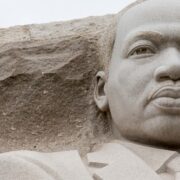James Baldwin: A Voice of Transformation
James Baldwin, an American novelist, playwright, essayist, poet, and activist, remains a towering figure in the literary and social landscape of the 20th century. Born 100 years ago on August 2, 1924, in Harlem, New York, Baldwin’s work has left an indelible mark on American culture, addressing complex issues of race, sexuality, and identity. His ability to weave personal narratives with broader social commentary made his voice unique and transformative. He wrote in 1955, “I love America more than any other country in this world, and exactly for this reason, I insist on the right to criticize her perpetually.” Baldwin died on December 1, at 63, at his home in southern France.
Early Life and Influences
Baldwin’s early life in Harlem, marked by poverty and a tumultuous relationship with his stepfather, profoundly influenced his writing. His stepfather, a preacher, provided Baldwin with a religious framework that would later inform his work, though Baldwin himself eventually distanced from organized religion. Despite the challenges of his youth, Baldwin found solace in literature, spending hours in libraries and discovering writers like Charles Dickens and Richard Wright, who would profoundly shape his literary path.
Literary Career
Baldwin’s first novel, “Go Tell It on the Mountain” (1953), is a semi-autobiographical work that explores the struggles of a young African American boy growing up in Harlem. The novel’s depiction of religious fervor, familial conflict, and personal awakening received critical acclaim and established Baldwin as a formidable literary talent.
In the 1950s and 1960s, Baldwin’s essays, particularly those collected in “Notes of a Native Son” (1955) and “The Fire Next Time” (1963), positioned him as a leading voice in the civil rights movement. These essays, characterized by their eloquence and incisive analysis, addressed the systemic racism embedded in American society. Baldwin’s writing was a critique and a call to action, urging Americans to confront their prejudices and work towards a more just society.
Activism and Exile
Baldwin’s activism extended beyond his writing. He was a prominent figure in the civil rights movement, aligning with leaders like Martin Luther King Jr. and Malcolm X. Baldwin’s willingness to speak out against injustice, often at significant personal risk, solidified his role as a moral compass for the nation.
However, Baldwin’s outspoken nature and the oppressive racial climate of America led him to seek refuge in France. His self-imposed exile allowed him the distance to critique American society more freely. However, he returned to the United States for extended periods to engage in the civil rights struggle. This transatlantic existence enriched his perspective, providing a comparative lens through which he could examine racial issues.
Exploring Sexuality
In addition to race, Baldwin’s work also delved into the complexities of sexuality. His novel “Giovanni’s Room” (1956), one of the first American novels to openly address homosexual themes, broke new ground. The book’s portrayal of a white American expatriate grappling with his sexuality in Paris was revolutionary, challenging societal norms and expanding the discourse on LGBTQ+ issues. Baldwin’s fearless exploration of sexuality and insights into the intersections of race and identity made his work resonate with a diverse audience.
Legacy
James Baldwin’s legacy is multifaceted. His literary achievements, activism, and public speeches continue to inspire and provoke thought. Baldwin’s ability to articulate the black experience in America with profound empathy and unflinching honesty has ensured his work remains relevant. His influence extends to contemporary writers, activists, and artists who draw upon his themes and stylistic approaches.
Moreover, Baldwin’s prescient observations about the enduring nature of racism and the necessity of love and compassion in the fight for justice offer timeless wisdom. His call for introspection and collective action echoes through movements such as Black Lives Matter, affirming his position as a prophetic voice whose work transcends the era in which it was written.
James Baldwin’s life and work embody the power of literature to effect social change. His fearless exploration of the human condition and unwavering commitment to justice have left an enduring legacy. As we continue to grapple with issues of race, identity, and inequality, Baldwin’s words serve as both a guide and a challenge, urging us to envision and strive for a more equitable world. Baldwin chronicled his time’s struggles through his writings and laid the groundwork for future generations to build upon.
Have your civil rights been violated? Contact the Civil Rights Law Firm of Figeroux & Associates today! We will fight for you. Call us at 855-768-8845 or visit www.askthelawyer.us to book a consultation. The lawyer you hire does make a difference!












Leave a Reply
Want to join the discussion?Feel free to contribute!